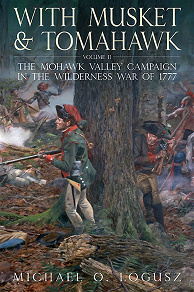E-bok
With Musket and Tomahawk Volume II
This is the second volume of Michael Logusz’s epic work on the Wilderness War of 1777, in which the British Army, with its German, Loyalist, and Indian auxiliaries, attempted to descend from Canada to sever the nascent American colonies, only to be met by Patriot formations contesting the invasion of their newly declared nation.
In his first volume, on the Saratoga campaign, the author described how Burgoyne’s main thrust was first stalled and then obliterated during its advance down the Hudson River. Burgoyne had hoped to be met by a corresponding British thrust from New York City, but this never materialized, Lord Howe opting to attack Philadelphia instead. But the British had indeed launched a third thrust from the west, embarking from Lake Ontario at Oswego and thence forging its way down the Mohawk Valley.
This third British thrust, under General Barry St. Leger, was perhaps the most terrifying of all, as it overran a sparsely populated wilderness where every man and boy had long needed to bear arms to protect against the ravages of the Iroquois Federation. Yet now the British—imitating the French before them—had made common cause with those same Indians, who now roamed across the frontier as the warpainted spearhead of the Empire’s new attack.
At Fort Stanwix in upstate New York a Patriot (former British) fort held fast, though surrounded by St. Leger’s forces and his Mohawk and Loyalist auxiliaries. A relief column some 800 strong under Nicholas Herkimer attempted to relieve the fort, but it was ambushed en route with most of its men—including the entire male population of several nearby communities—killed or wounded. At this Battle of Oriskany, the basis for the movie “Drums Along the Mohawk,” Herkimer himself was mortally wounded. Fortunately a sally from Fort Stanwix raided the Indian camp during the battle, compelling many of the warriors to desist from annihilating the entire column.
In the end, Fort Stanwix was relieved only when Benedict Arnold—soon to excel at Saratoga, just as he had done at Valcour Island and elsewhere throughout the Revolution—marched his troops through and forced the British to give up their western onslaught.
In this book, as in his highly acclaimed first volume, the author captures the terrain, tactics and terror of this brutal, multifaceted wilderness war as few writers have done before. It was neighbor against neighbor, native Americans on both sides, and European professionals against Colonial Patriots, in a desperate campaign that helped determine America’s fate.
In his first volume, on the Saratoga campaign, the author described how Burgoyne’s main thrust was first stalled and then obliterated during its advance down the Hudson River. Burgoyne had hoped to be met by a corresponding British thrust from New York City, but this never materialized, Lord Howe opting to attack Philadelphia instead. But the British had indeed launched a third thrust from the west, embarking from Lake Ontario at Oswego and thence forging its way down the Mohawk Valley.
This third British thrust, under General Barry St. Leger, was perhaps the most terrifying of all, as it overran a sparsely populated wilderness where every man and boy had long needed to bear arms to protect against the ravages of the Iroquois Federation. Yet now the British—imitating the French before them—had made common cause with those same Indians, who now roamed across the frontier as the warpainted spearhead of the Empire’s new attack.
At Fort Stanwix in upstate New York a Patriot (former British) fort held fast, though surrounded by St. Leger’s forces and his Mohawk and Loyalist auxiliaries. A relief column some 800 strong under Nicholas Herkimer attempted to relieve the fort, but it was ambushed en route with most of its men—including the entire male population of several nearby communities—killed or wounded. At this Battle of Oriskany, the basis for the movie “Drums Along the Mohawk,” Herkimer himself was mortally wounded. Fortunately a sally from Fort Stanwix raided the Indian camp during the battle, compelling many of the warriors to desist from annihilating the entire column.
In the end, Fort Stanwix was relieved only when Benedict Arnold—soon to excel at Saratoga, just as he had done at Valcour Island and elsewhere throughout the Revolution—marched his troops through and forced the British to give up their western onslaught.
In this book, as in his highly acclaimed first volume, the author captures the terrain, tactics and terror of this brutal, multifaceted wilderness war as few writers have done before. It was neighbor against neighbor, native Americans on both sides, and European professionals against Colonial Patriots, in a desperate campaign that helped determine America’s fate.
Logga in för att låna
Information
Stöds av följande plattformar
PC/Mac
Surfplatta Läsplatta
Smartphone

